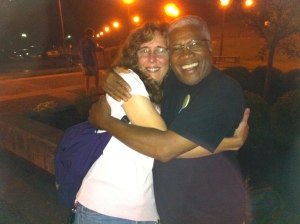I’ve often described the Augusta Heritage Workshops, on the campus of Davis & Elkins College in Elkins, West Virginia, as a place where you can walk the streets any hour of the day or night singing out loud to yourself and no one will think you’re crazy. Someone might even come along and start singing harmony with you, or whistle up an accompaniment. Augusta is a great place to be if you’ve got rhythm going on in your head all the time.
A while back, some TV interviewer asked Paul McCartney why he still writes and performs songs. McCartney looked at the guy for a moment, and after a slight pause, answered, “Ummm…it’s…what I do.” The unknown kid that McCartney once was heard music in words, and the songs just spilled out of him. If he had never become famous, no doubt he still would have made music. It’s what he does.
I can’t imagine anyone who goes to Augusta asking that question. For 51 weeks out of the year, most of them work some kind of regular job. They teach school, or work for the government. They’re social workers or media people. If you ask, you might turn up a NASA scientist, an astronomer, a computer geek or two, an administrator, a business owner, an engineer, an appliance repairman. One accomplished old-time fiddler is a Hollywood animator. For a lot of them, in their workaday worlds it’s important to have a string of letters after their names so everyone will understand who they are. But for one week out of the year—maybe two or three—at Augusta we’re all singers and musicians and dancers.[1]
This time last week, some of us were hauling ourselves out of our dorm room beds where we had flopped for only a short time, and were preparing to make our way to the chapel for the Sunday morning ceremonial rite that always closes out the five week-long summer sessions.
The annual gospel sing, from 10 a.m. until noon, is an event that a lot of Augustians don’t want to miss, regardless of their religious persuasion, or lack thereof. Augusta is one of few places where you can tap into the fervor of old-time American religion through music and skip the divisive dogma. You’ll find professing Muslims, atheists, seriously lapsed Baptists, Buddhists, and followers of their own amalgamated doctrines along with Christians of every shade and stripe heartily wailing “I’ll Fly Away,” and “Farther Along.”
Earlier in the week, folks were commenting on the power and style of student Wesley Cantor’s voice, and someone knowingly predicted, “He will be famous some day,” which reminded me of what my anthropology professor, Stavros Deligiorgis, had to say about fame. “The word ‘fame’ is related to ‘flame,’” he said, and described the tongues of fire that scorch, burn, and often engulf the famous. And I remembered Ken Kesey’s description in Rolling Stone magazine of John Lennon breaking up a brewing fight in the Abbey Road studio simply by walking into the room. Kesey said that Lennon had been burnished in the white-hot fire of fame that decimates many a lesser mortal.
Maybe an unrequited lust for fame lurks behind the curtains of most of our psyches, at least until we get a taste of the negative side of being famous. I laugh when I think of someone like Elvis Presley auditioning for “American Idol.” But I could easily see Elvis, John Prine, Janis Joplin, B. B. King, Billy Joel, Bessie Smith—even Paul McCartney—hanging out at the Ice House or on the porch at Halliehurst, having the time of their lives just making music for the joy of it.
[1] I don’t mean to ignore the crafters, scholars, and cooks who come to Augusta to learn about stuff such as timber framing, quilting, Cajun cooking, instrument repair, blacksmithing, painting, etc. etc. etc. but they usually aren’t the ones who are whooping it up on Hallihurst porch at 4 a.m. Correct me if I’m wrong.


